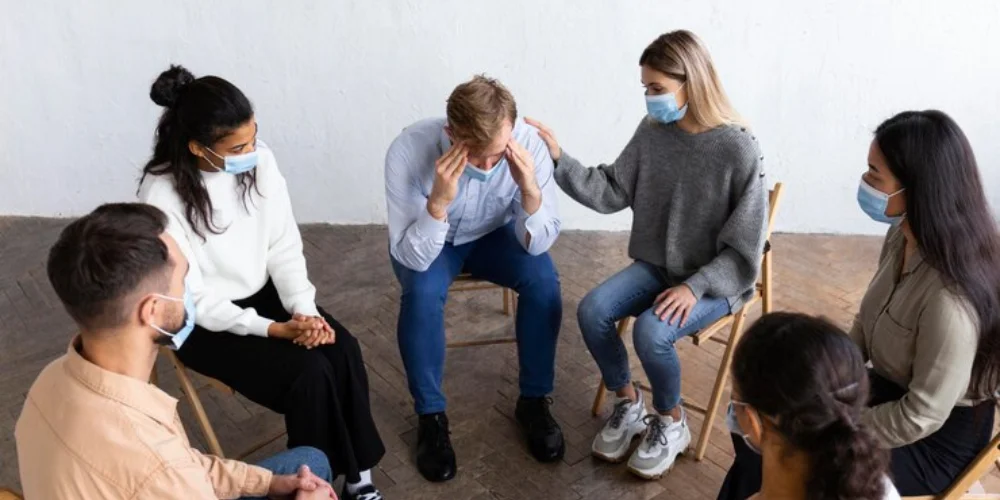Tips for Improving Mental Health and Well-being
Meta Description: Discover effective strategies for improving mental health and well-being. Learn how to boost your mental health with practical tips, including physical activity, stress management, and more.
Introduction
Enhancing mind health and well-being is vital to a fulfilling level of energy. In today’s fast-paced world, with increasing pressures from work, personal responsibilities, and social expectations, taking care of our mental health often becomes secondary. However, investing time and effort into enhancing your mental health can lead to a more satisfying, productive, and joyful life.
Mental health is not merely the absence of mental illness but a state of emotional, psychological, and social well-being.It impacts how we think, feel, and act, and influences how we handle stress, connect to others, and make choices. This comprehensive guide will explore practical strategies to boost your mental health and well-being, offering actionable tips and insights to help you lead a healthier, more balanced life.

The Connection Between Physical and Mental Health
Physical exercise is one of the multiple effective ways to enhance mental wellness. Exercise triggers the release of endorphins, also known as the “feel-good” hormones, which can elevate mood and reduce feelings of depression and anxiety. Regular physical activity also helps reduce stress, improve sleep quality, and enhance overall cognitive function.
How Much Exercise Do You Need?
The general recommendation is to aim for at least 30 minutes of moderate exercise most days of the week. This doesn’t have to be a strenuous workout; even activities like walking, gardening, or cycling can be beneficial. The key is to find an activity you enjoy and make it a routine.
Examples of Effective Physical Activities:
- Walking: A daily walk in the park can be a great way to exercise and clear your mind.
- Jogging or Running: Provides a more intense workout and can be highly effective for boosting mood.
- Yoga or Pilates: Enhances flexibility, strength, and relaxation through controlled movements and deep breathing.

Incorporate Deep Breathing and Breathing Exercises
The Science Behind Breathing Exercises
Deep breathing and breathing practices are effective strategies for handling stress and improving mind well-being. When we are stressed, our breathing tends to become shallow and rapid, which can exacerbate feelings of anxiety. Deep breathing helps to activate the parasympathetic nervous system, promoting relaxation and reducing stress.
How to Practice Deep Breathing
Sure, here are a few techniques to incorporate into your daily routine:
- Diaphragmatic Breathing: Breathe deeply through your nose, allowing your abdomen to expand. Exhale slowly through your mouth. Repeat for several minutes.
- Box Breathing: Inhale for four counts, hold for four counts, exhale for four counts, and then hold for four counts again. Repeat the cycle.
- 4-7-8 Breathing: Inhale for four counts, hold the breath for seven counts, and exhale slowly for eight counts. This technique can be beneficial before bed to promote restful sleep.
Manage Stress Effectively
Understanding Stress
Stress is an unavoidable part of life, but chronic stress can negatively impact your mental and physical health. Effective stress management is crucial for maintaining mental well-being and preventing burnout. Identifying your stressors and developing strategies to cope with them can make a significant difference.

Effective Stress Management Techniques
- Mindfulness and Meditation: Practice mindfulness to stay present and astress. Meditation can help calm the reason and enhance focus.
- Time Management: Break tasks into less steps, prioritize essential tasks, and set realistic purposes to stop touching crumbled.
- Relaxation Techniques: Incorporate progressive muscle relaxation, tai chi, or gentle stretching to reduce tension.
Creating a Stress Management Plan
Develop a personalized plan that includes stress-relief activities you enjoy. Review and adjust the plan regularly as needed to address changing stress levels and life circumstances.
The Benefits of Gratitude
Rehearsing gratitude concerns remembering and enjoying the positive aspects of your life. Research shows that regularly expressing gratitude can enhance mood, improve relationships, and increase overall life satisfaction.
Ways to Practice Gratitude
- Gratitude Letters: Write letters to people who have positively impacted your life, expressing your appreciation and gratitude.
- Daily Reflection: Spend a few minutes each day reflecting on positive experiences and things you are thankful for.

Learn New Skills
The Power of Continuous Learning
Discovering new talents keeps the mind busy and involved. It provides a sense of achievement and improves self-esteem. Engaging in new activities can also be a great way to reduce stress and improve cognitive function.
How to Choose New Skills
- Explore Interests: Choose skills or hobbies that genuinely interest you. Whether image, playing a musical device, or cuisine, find something that excites you.
- Join Classes or Workshops: Enroll in classes or workshops to gain new knowledge and skills in a structured setting.
Address Mental Illness
Seeking Professional Help
If you experience symptoms of mental illness, seeking professional help is crucial. Mental health professionals, such as therapists, counselors, and psychiatrists, can provide support, therapy, and medication tailored to your needs.
Signs That You Should Seek Help
- Persistent feelings of sadness or hopelessness
- Excessive anxiety or worry
- Difficulty functioning in daily life
- Changes in sleep or appetite
- Thoughts of self-harm or suicide
Types of Professional Support
- Therapy: Cognitive-behavioral therapy (CBT), psychodynamic therapy, and other therapeutic approaches can help address mental health issues.
- Medication: Prescribed medication can be an effective treatment for certain mental health conditions
- Listen to Music
The Therapeutic Effects of Music
Music has a profound impact on mental health. Listening to music can evoke emotions, enhance mood, and provide relaxation. It is a versatile tool for managing stress and improving overall well-being.
How to Use Music for Mental Health
- Create Playlists: Curate playlists for different moods, such as calming music for relaxation or upbeat tracks for motivation.
- Music Therapy: Explore music therapy techniques with a trained therapist to address specific mental health concerns.
- Engage in Music Activities: Consider learning to play an instrument or sing to express emotions and reduce stress.

Manage Health Problems
The Relationship Between Physical and Mental Health
Chronic health problems can significantly impact mental well-being. Managing physical health issues effectively is essential for overall mental health. Addressing health problems through appropriate medical care and lifestyle changes can reduce their impact on your mental state.
Strategies for Managing Health Problems
- Follow Medical Advice: Adhere to treatment plans and follow-up appointments with your healthcare provider.
- Healthy Lifestyle Choices: Incorporate a balanced diet, regular exercise, and sufficient sleep into your routine.
- Support Systems: Seek support from healthcare professionals, family, and friends to manage health challenges
Prioritize Regular Sleep
The Importance of Quality Sleep
Quality sleep is essential for mental health. Sleep deprivation can lead to mood swings, decreased cognitive function, and increased stress. Prioritizing regular sleep helps regulate mood, enhance cognitive abilities, and support overall well-being.
Tips for Improving Sleep Quality
- Establish a Routine: Go to bed and wake up simultaneously each day, even on weekends.
- Create a Relaxing Bedtime Routine: Engage in calming activities before bed, such as reading or a warm bath.
Connect with Family and Friends
The Role of Social Connections
Strong social connections are vital for mental health. Spending time with family and friends provides emotional support, reduces feelings of loneliness, and enhances overall well-being. Meaningful relationships contribute to a sense of belonging and improve mental resilience.
How to Foster Connections
- Schedule Regular Interactions: Make time for face-to-face interactions with loved ones, even just a phone call or video chat.
- Participate in Social Activities: Engage in group or community events to meet new people and strengthen existing relationships.
- Provide and Seek Support: Offer support to others and seek help to build a strong support network.

Use Social Media Mindfully
Strategies for Mindful Social Media Use
- Set Boundaries: Limit your social media use and avoid excessive scrolling, especially before bed.
- Curate Content: Follow accounts that uplift and inspire you, and unfollow those that contribute to negative feelings.
- Engage in Real-Life Interactions: Balance online interactions with face-to-face connections to foster more meaningful relationships.
Conclusion
Improving mental health and well-being is a multifaceted journey that involves addressing various aspects of your life. You can significantly enhance your mental and emotional resilience by incorporating practical strategies such as staying physically active, practicing deep breathing, managing stress, and nurturing social connections.
Prioritizing self-care and adopting positive habits are crucial to fostering a healthier, more balanced life. Engaging in regular physical exercise not only boosts mood but also contributes to overall physical health. Deep breathing exercises can provide immediate relief from stress while practicing gratitude helps shift your focus to the positive aspects of your life.
Learning new skills keeps your mind engaged and fosters a sense of accomplishment, while professional support ensures that mental health issues are addressed effectively.

Recent Post
-
 Top 20 Tips to Improve Your Sleep When Times Are Tough
Top 20 Tips to Improve Your Sleep When Times Are Tough -
 Boost Your Mental Health with Mindfulness and Meditation Practices | Tips 2024
Boost Your Mental Health with Mindfulness and Meditation Practices | Tips 2024 -
 Stress Management Tips and Tricks | 100% Best Solutions of Stress
Stress Management Tips and Tricks | 100% Best Solutions of Stress -
 Depression and Anxiety | 10 Best Treatments for Depression & Anxiety
Depression and Anxiety | 10 Best Treatments for Depression & Anxiety -
 Weight Lose Fast: Scientific and Sustainable Lose Weight Top 15 Tips
Weight Lose Fast: Scientific and Sustainable Lose Weight Top 15 Tips
